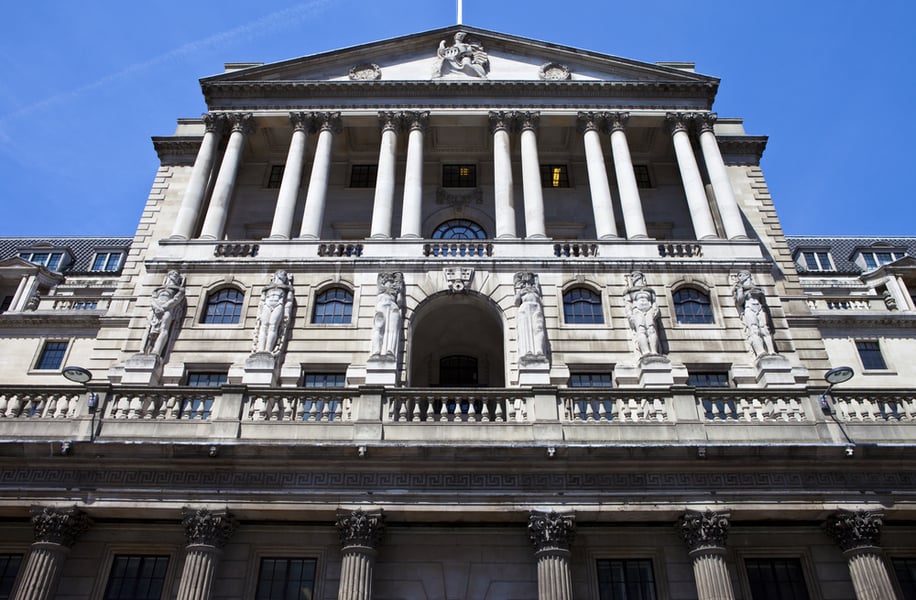If the bank keeps base rates on hold, it will face criticism from all quarters. But let’s be grown-up here.

Tony Ward is chief executive of Clayton Euro Risk
I genuinely tried not to write yet another blog on interest rates – I had a rant just two weeks ago – however, after reading views expressed by The Economist this week, I couldn’t resist.
In my defence, I should note that a decision by the MPC is now imminent (November 2).
The key points made in the Economist’s leader column sit very nicely with my own: a tightening of monetary policy by the Bank of England seems the right thing to do – but just not yet.
Why do we believe this?
Well, it’s primarily a result of anaemic wage growth and a patchy-but-not-substantial rise in economic growth.
And, hanging over all of this is the Brexit threat, which The Economist believes is far from over.
The publication argues that securing a transitional arrangement that seeks to preserve the status quo may be harder than the government thinks.
Waiting until January, after the European Union’s December summit, makes much more sense. I agree.
Investors believe a rise in the interest rate is all but a done deal with markets pricing in a 90% chance of the first increase in more than 10 years.
Better than expected figures last week showing the economy grew by 0.4% in the third quarter have cemented these expectations.
However, in my mind this rise was paltry.
I concur with Ross Andrews from Minerva Lending who said: “If all we can muster... is an acceleration in economic growth that's so small you could blink and miss it, the Bank of England could still think better of a rate rise next week.”
Businesses appear to be issuing appeals for the Bank of England to leave well alone next week.
The British Chambers of Commerce warned that a rate rise could be the ‘tipping point’ that crashes business confidence and investment. “It is pretty extraordinary, given that economic conditions are slowing, that we are talking about interest rate rises,” said Suren Thiru, a BCC economist.
Tej Parikh, economist at the IoD, urged Mr Carney to wait until progress was made in the Brexit negotiations.“There is not enough clarity on the path for economic growth yet. A lot of things need to be fleshed out in terms of Brexit negotiations,” he said.
Mr Parikh said firms would face extra pressure from a rate rise as their customers were already struggling and would be stretched by rising borrowing costs.
Data released last Friday revealed that a record number of individuals are finding themselves unable to service their debts. Personal insolvencies rose by 11% in the three months to September, figures from the Insolvency Service showed.
This was 8% higher than the same period last year, largely as a result of an all-time high of 15,523 individual voluntary agreements.
Adrian Hyde, president of R3, the UK’s insolvency and restructuring trade body, said that these figures were the result of ‘falling real wages and exhausted credit limits’.
Apart from the odd quarterly dip, he noted, the overall trend of insolvencies has been rising since the second half of 2015.
“Some people have trouble paying for basics, like food or housing, let alone paying for luxuries.
R3’s long-running survey of personal debt levels typically finds around two-in-five people saying they often or sometimes struggle to make it to payday,” Mr Hyde said.
Alec Pillmoor, personal insolvency partner at tax consultancy firm RSM is concerned. He said: “Should the widely predicted increase in interest rates occur next week, this will have a significant effect on those households that are just managing on their income.”
Worrying. And on top of this, EY Item Club has raised concerns about the progress of UK economic growth.
It suggested that the government must move swiftly to seal a Brexit transition deal to avoid a collapse in business investment.
The economic forecaster expects investment to grow by 1.5% next year, down from 2.1% this year – but only if transitional arrangements are in place.
“Businesses’ motivation and willingness to invest are being pressurised significantly by major economic and political uncertainties over the future, which are centred on Brexit,” said the club’s Howard Archer.
Too much at stake. Not enough certainty yet.
I’ve mentioned this before, and The Economist agrees, that the problem facing the MPC is that having talked up the possibility of an imminent rate rise, its members don’t want egg on their faces.
If the bank keeps base rates on hold, it will face criticism from all quarters.
But let’s be grown-up here. To quote The Economist, ‘waiting a bit too long before tightening will do little damage; tightening too early could do a lot’.



